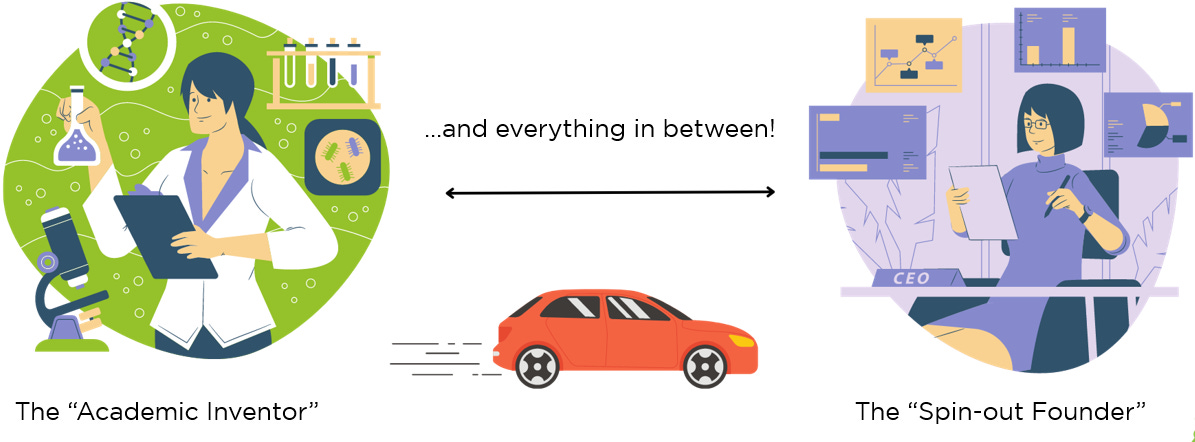Can researchers be spin-out founders?
The short answer is "hell yes"
100% yes, researchers can of course be founders - in the same way that anyone in society can have the entrepreneurial drive and spirit to lead a start-up to success.
Indeed, many of the skills that people learn in the world of research (such as project management, time management, dealing with complex problems and data, analytical skills, delivering results with limited resources, dealing with challenging personalities, pursuing bold ideas etc) can come in handy in the world of start-ups and entrepreneurship.
And a researcher/inventor behind a new technology opportunity will often be the master of the secret sauce and hold relentless drive to see their invention out in the world making a real difference to people’s lives and the planet.
The long answer is more complex. I loved this recent post from James Pinner at NZ Growth Capital Partners (NZGCP) exploring this very topic. It made me think how far we’ve come in that the debate around researcher founders has moved on from the black and white - we’re starting to get comfortable with researcher inventors having different roles within a spin-out/start-up* depending on their personal drivers and skill-sets.
Historically, those looking from the outside in at universities and Crown Research Institutes (CRIs) might have observed a researcher with a potentially game-changing idea and take a traditional ‘tech’ start-up or SaaS view… here is a “founder” with a great idea - if only we could get them out of the institution and have them start a company.
The realities of deep-tech mean that technical risk, technology development and IP management are often the biggest hurdles facing university and CRI spin-outs from the get go. It is rarely (if ever) as simple as building a minimum viable product (MVP), alongside a lean go-to-market plan and pivoting several times as you go. The spin-out might also require the resources, labs and ongoing R&D support from the originating research institution in order to successfully get through the early stages of life.
This inherent requirement for scientific wizardry means that some form of commitment from the researcher inventor to the spin-out will likely be critical for success.
With this in mind, it can be helpful to think of the technology lead and “founder” CEO as distinct roles which may or may not be held by the same person. In some cases (akin to a traditional tech start-up) the researcher inventor will be the person who steps up and steps out, taking on the role of employee #1 - CEO and technical founder.
Indeed, we’ve seen some inspirational individuals graduating from the KiwiNet Emerging Innovator Programme like Vlatko Materić, Jonathan Ring, Shalini Divya and going on to lead their own spin-outs.
There are many folk out there that firmly believe (and full disclosure that I also take this view) that researchers CAN take the lead. Daniel Batten is one such champion who has supported many entrepreneurial researchers on their entrepreneurship journey through his Exponential Founders programme. And Auckland UniServices have shown the power of empowering university researchers and students through their Inventors Fund, working alongside Return On Science.
However, becoming a deep-tech company founder is not everyone’s cup of tea. For many researchers in our public research organisations, the very thought of leaving their institution to form a start-up company is enough to a induce a cold sweat, and their skill-sets may not be aligned to a role as start-up CEO. The National Science Challenge for Technological Innovation (SfTI) have done a recent deep-dive on researcher drivers and capacity
An arrangement whereby spin-outs can successfully move forward while a key researcher remains in-house can be a positive both for individuals who feel best-placed to remain in a research environment and for research organisations keen to retain a key member of their research capability.
For some researchers, a form of ‘technical lead’ role will be a happier space, working alongside a founding CEO with the business and commercialisation acumen to lead an early-stage high-growth technology company to success. A shout-out to Jerome Leveneur and Christina Houlihan, co-founders of bspkl and to Andrew Králíček of ScentianBio.
Or perhaps the inventor might continue working in a research environment, while providing ongoing support to the spin-out in a scientific advisory capacity, inspiring others to follow in their footsteps on the commercialisation journey. Fist-bumps to Andrea Bubendorfer and Aaron Marshall who are actively leading the entrepreneurial charge within their own organisations.
All options are possible and it is clear that there are a plethora of sophisticated models emerging that adapt to the underpinning motivations and skillsets of our researcher inventors.
Wellington UniVentures have developed a range of flexible options for creating new ventures researchers, suitable for for different types of innovators. And the Main Sequence Ventures model in Australia has attracted international interest. There are of course many more examples, too many for one post.
It’s encouraging to see more and more researchers in our public research organisations seeing commercialisation as a pathway-to-impact for them, as an opportunity to see their inventions out in the world making a real difference - and stepping out (or not) in a way that works for them. It’s equally encouraging to see more of our public research organisations embracing more flexible and supportive models to enable researchers to walk the path.
Regardless of whether you are a ‘spin-out founder’ or ‘academic inventor’ (or anything in between!), the most important common characteristic is commitment to the journey.
* A start-up is a company that is created from scratch, often by an entrepreneur or group who have an idea for a product or service. A spin-out (aka a spin-off) is a company that is created from an existing organisation, such as a university or research institute.



Bonus shout out to Brendan Darby, CEO and researcher founder of Marama Labs taking their groundbreaking Cloudspec technology to market. One of our superb Emerging Innovator graduates. Thanks, Brendan, for the encouragement. 🙋♂️ 🙌